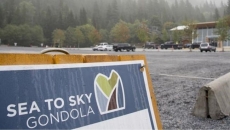VANCOUVER - By some measures, the ongoing outbreaks of avian flu in British Columbia pale when compared to the devastating eruption of the disease in 2004 that prompted a cull of 17 million birds.
But the enemy that farmers and scientists now face represents an unprecedented challenge, experts say.
The current H5N1 strain is "behaving very differently" to previous versions, says British Columbia chief veterinarian Theresa Burns.
Unlike previous strains that were isolated in geography, the new threat is spreading across the country. The strain is highly pathogenic and can cause serious disease and death in birds.
"The scale is completely different," Burns said in an interview, compared to previous B.C. outbreaks in 2004, 2009 and 2014.
"In all those other outbreaks, B.C. was the only province impacted, and it was only in the Fraser Valley. Now we're seeing all across Canada, North America and Europe impacted."
This year, H5N1 has infected about 200 flocks with more than 3.5 million birds Canada-wide. Worryingly, deaths of wild birds are spiking, amid fears the disease has become endemic in Canada.
The disease, which has spread across Asia and Europe and can occasionally infect humans, emerged in Canada for the first time in six years when it was identified in Newfoundland in December 2021.
Earl Brown, a flu virologist at the University of Ottawa, said at the time it was likely an infected waterfowl had been blown across the North Atlantic to Newfoundland.
Since then, further outbreaks have been detected in Alberta, British Columbia, Manitoba, New Brunswick, Nova Scotia, Ontario, Quebec and Saskatchewan.
"This particular strain, the H5N1 virus, is causing increased mortalities in many of our wild bird species, and when it gets into poultry flocks, it's also causing increased mortality," Burns said.
The Canadian Food Inspection Agency, or CFIA, said it believes migratory birds are responsible for the outbreaks in small and commercial poultry flocks.
The agency's latest available data shows there have been 203 infected flocks countrywide, affecting 3,632,000 birds, as of Nov. 3.
It also reported 1,442 confirmed cases of avian flu in wild birds across Canada, but Burns said the number is likely much higher because as it is impossible to determine how many wild animals have died.
"For (avian flu) to be detected in a wild bird, first you have to find the carcass, then the carcass has to get submitted to the lab, then it has to be tested. So, we imagine that there's many birds that might be dying that we're not able to detect."
Ray Nickel, spokesman for the B.C. Poultry Association Emergency Operations Centre, said farmers are now worried the virus is becoming endemic in wild bird populations.
Avian flu is spread through contact with an infected bird or its feces or nasal secretions. Farm birds that go outside are most at risk because they can come in direct contact with infected wild birds or their feces.
Humans can also inadvertently carry the infection into a barn on their shoes or clothing.
Nickel said the scale of the spread of H5N1 had one benefit — it has prompted more co-ordination between farmers, CFIA and various levels of government.
"(Communication) is way bigger this year than ever," he said. "Discussions are now happening on a national and international basis, rather than just on an individual provincial basis."
Nickel, a commercial poultry farmer in Abbotsford and member of the BC Chicken Marketing Board, said B.C. has not suffered terrible loss when compared to other provinces and previous seasons.
The 2004 outbreak in the Fraser Valley, for instance, involved the H7N3 strain, which spread to 42 commercial farms and 11 backyard coops, prompting federal officials to order the mass cull of about 17 million birds.
CFIA statistics show 28 flocks in B.C., with 275,700 birds, have been infected by avian flu this year.
"We've evolved to a certain degree in our industry to pay attention to biosecurity and keeping our farms as safe as possible," Nickel said. "We're also not seeing a lot of historic issues that we used to be most worried about (like) spread from one infected farm to another. Now, it seems to be happening more randomly."
Biosecurity and emergency management measures introduced after the 2004 outbreak helped to control the spread of the virus in 2009 and 2014. Each outbreak has allowed the province and its farmers to improve and refine its response, Nickel said.
The poultry association has an emergency response team that operates using an incident command structure, similar to fire and police services, allowing the team to respond quickly when flu is found, he said. Protocols include strict procedures around locked gates, changing clothing and footwear, and monitoring entrances and exits.
"The heightened level of concern around biosecurity, I think, has gotten even more intense, not only in B.C., but across the country," Nickel said in an interview.
However, he warns that the demands and requirements of the emergency response team is creating burnout among members.
"We are getting tired. It's exhausting to be on all the time," Nickel said. "We are having to rethink how we are going to manage this going forward."
Canada currently has a "stamping out policy," which means birds are euthanized when the virus is detected in a flock, Burns explained.
"There's really two reasons: the birds are really sick and there is no viable treatment to prevent spread," she said.
But, experts from around the world are debating whether an avian flu vaccine would be a viable solution.
"Given the unprecedented nature of this outbreak, certainly vaccination is being revisited as a possible control strategy internationally," Burns said.
"There are no licensed vaccines in Canada at this time for poultry and that's because up until now, stamping out has been our best course of action, (but) the CFIA is working with international partners to continue that vaccination discussion."
Considerations for whether a vaccine would work include administration method, cost and the risk of vaccinated birds spreading the virus undetected.
"So, there are some real challenges with vaccination and we need to really understand those before we can determine if it's a viable strategy, and the CFIA, of course, would make those decisions," she said.
The CFIA said no human cases have been detected in Canada and the illness is not considered a significant health concern for healthy people who are not in regular contact with infected birds.






